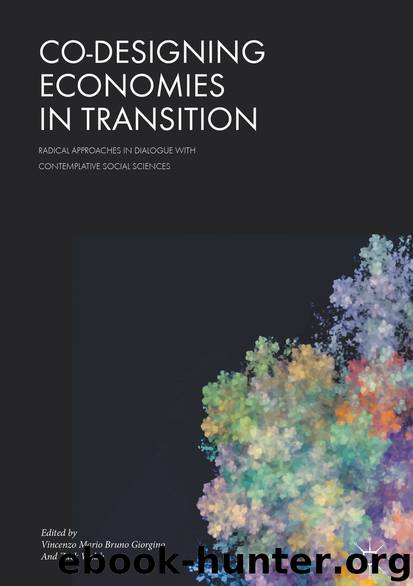Co-Designing Economies in Transition by Vincenzo Mario Bruno Giorgino & Zack Walsh

Author:Vincenzo Mario Bruno Giorgino & Zack Walsh
Language: eng
Format: epub
Publisher: Springer International Publishing, Cham
Concluding Remarks
These illustrations of selected topics, which, in one way or another, may be seen as fitting under the wide umbrella of feminist economics, demonstrate how academic and political critiques as well as the development of new theories, methods and concepts are all closely related to political struggles at every level. They also illustrate how the feminist movement, broadly defined, has played a pivotal role in each of these cases.
The economy is one of 12 critical areas advancing women’s rights according to the Beijing Platform of Action that was agreed upon at the fourth UN Women’s conference in 1995. Twenty years later, however, the economy is the field in which the least progress has been achieved, though, in this same period, feminist economics has proliferated and grown into a field of its own. Although policies seem to remain largely unchanged by feminist economic analysis, there are also signs of change, illustrated by the inclusion of unpaid subsistence production in the UN Standard of National Accounts in 1993, the increasing use of alternative indicators of well-being , the implementation and institutionalization of GRB in many countries and recent initiatives by the International Monetary Fund to further develop GRB.
These cases, which include the valuation of care and unpaid work , GRB, domestic violence and the use of human rights in assessing macroeconomic policy, all illustrate the dynamics between academic work, feminist critiques and activism, both within and outside of academia, as well as the role that feminist academic and activist involvement plays in developing critiques of international and regional institutions, shaping, in particular, the importance of the UN system and the European Union. This brief outline of selected topics from the field of feminist economics illustrates how academic critique, new theories, concepts, knowledge, new methods and indicators are important.
However, new knowledge alone is not sufficient to produce change. To the extent that feminist economics has contributed to making what really matters count in economic decision-making as described in this chapter, successes have depended on a combination of several factors. These factors include the institutionalization of feminist economics as an academic field, the institutionalization and systematization of relevant statistics and, above all, the pivotal role that feminist activism and advocacy plays in encouraging personal involvement, networking and alliances between academics and activists. This latter aspect encourages experts and academics to actively employ their expertise within organized civil society groups and formal institutions to further the diversity of initiatives, approaches and their policy impact.
This chapter has discussed how feminist economic critiques and theorizations have been employed to influence and change conceptual and regulatory frameworks as well as policies at the state and the international level. These examples of knowledge production and policymaking at the macro level are, however, not exhaustive, nor are they the only way in which feminist economics is relevant in conceptualizing a better, more inclusive and better functioning economy that serves the well-being of all. The question of who the economy and economic activity should serve, and what is the aim
Download
This site does not store any files on its server. We only index and link to content provided by other sites. Please contact the content providers to delete copyright contents if any and email us, we'll remove relevant links or contents immediately.
Rich Dad Poor Dad by Robert T. Kiyosaki(6612)
Bad Blood by John Carreyrou(6611)
Principles: Life and Work by Ray Dalio(6421)
Playing to Win_ How Strategy Really Works by A.G. Lafley & Roger L. Martin(6237)
Management Strategies for the Cloud Revolution: How Cloud Computing Is Transforming Business and Why You Can't Afford to Be Left Behind by Charles Babcock(4563)
The Confidence Code by Katty Kay(4251)
Thinking in Bets by Annie Duke(4218)
American Kingpin by Nick Bilton(3875)
Delivering Happiness by Tony Hsieh(3418)
Project Animal Farm: An Accidental Journey into the Secret World of Farming and the Truth About Our Food by Sonia Faruqi(3212)
The Power of Habit by Charles Duhigg(3128)
The Tyranny of Metrics by Jerry Z. Muller(3065)
Brotopia by Emily Chang(3049)
The Marketing Plan Handbook: Develop Big-Picture Marketing Plans for Pennies on the Dollar by Robert W. Bly(3047)
Mastering Bitcoin: Programming the Open Blockchain by Andreas M. Antonopoulos(3035)
I Live in the Future & Here's How It Works by Nick Bilton(2993)
The Content Trap by Bharat Anand(2917)
Building a StoryBrand by Donald Miller(2896)
Applied Empathy by Michael Ventura(2892)
